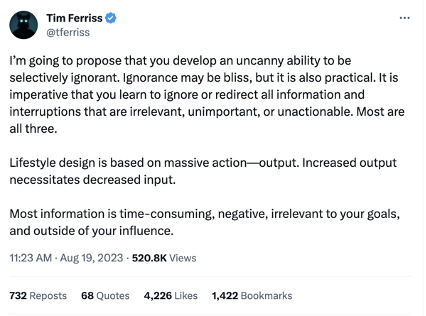Caught in a whirlwind of non-stop questions and interruptions?
Feeling like your day is slipping through your fingers without accomplishing what you planned?
You’re not alone, and this pattern sabotages teams’ productivity everywhere.
I like Tim Ferriss’s view on this:
Constant interruptions with questions and discussions are hindering productivity.
The scattered approach to communication not only interrupts focus but leads to double the lost productivity, affecting both the leader and the team members.
Each interruption pulls us (and our team members) off task.
The projects are lagging, stress is escalating, and both leaders and team members are trapped in a cycle of inefficiency.
How can we escape this constant tug-of-war?
A solution may lie in organizing our communication more thoughtfully.
What if a simple three-step process could help us determine when to address an issue immediately and when to defer it for later.?
Here’s a strategy we can all adopt:
1️⃣Create a Daily Communication List:
Begin by creating a list of people you communicate with daily, along with a collection of topics you need to discuss.
This isn’t just a to-do list; it’s a tool that fosters discipline and ensures that every communication is purposeful and well-timed.
Instead of stopping your work and sending someone a message on Teams, Slack, or even a Zoom call, write it on the list.
No more sporadic interruptions or scrambling thoughts; every interaction is planned, focused, and efficient.
But, you’re wondering, what if my problem is urgent?
This next step will show you exactly how to make the decision.
2️⃣Use the Mental Flowchart:
Before interrupting someone’s work (including your own), ask:
- Is this issue urgent enough to be addressed now?
- Can I continue my work without an immediate resolution?
- Did I already attempt to find my own solution?
If the answers lead you to wait, simply jot down the question beside the person’s name on the list and address it at the appropriate time.
Simple? Yes.
Impactful? Absolutely!
Interruptions aren’t just annoyances; they disrupt our mental workflow.
On average, it takes 20 minutes to refocus after an interruption. That’s 40 minutes of lost productivity for both parties involved.
3️⃣Implement a “Deep Work Window:”
The idea of a “Deep Work Window” is gaining traction among top-performing teams.
It’s a designated period where the entire team agrees not to interrupt each other, allowing for focused, undistracted work. During this time, all meetings, notifications, and any non-urgent communications are put on hold.
Not only does this promote individual productivity, but it also encourages team members to plan their own work and questions around these deep work sessions.
The result? Fewer interruptions, more thoughtful questions, and a collective appreciation for focused time.
It’s a practical application of Tim Ferriss’s insights, creating an environment that minimizes distractions and maximizes output.
Incorporating a Deep Work Window into your team’s routine represents another step in cultivating a culture of thoughtful communication and self-reliance.
Building Leaders Through Strategic Communication:
Adopting this daily communication list and mental flow chart isn’t just a personal habit; it’s a cultural shift within the team.
It encourages self-reliance and fosters a culture where team members seek solutions before seeking help.
The strategy of managing daily communication is an integral part of building resilient and self-reliant leaders within an organization.
Conclusion:
In embracing this thoughtful communication strategy, leaders are not only doubling productivity; they are doubling down on a commitment to nurturing the next generation of leaders, positioning the organization for long-term success and stability.
It’s a simple change that can provide a massive ROI.


